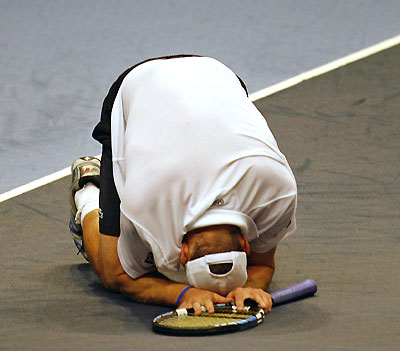Davis Cup brings out passion and crazy hats
Updated: 2007-09-26 09:26
GOTHENBURG, Sweden: In 1900, Dwight Filley Davis donated a silver trophy for a tennis competition between the United States and Britain.
Little did the Harvard student know then that a century later teams from more than 130 countries would be playing in the tournament that bears his name, nor that it would arouse fierce devotion in fans such as Anthony Glavanic.
 Andy Roddick of the US falls to his knees after defeating Jonas Bjorkman of Sweden in their Davis Cup World group semi-final tennis match in Gothenburg September 23, 2007. [Reuters] |
Glavanic, a stocky, dark-haired tennis instructor, helps to organise the "Net-heads," a band of tennis die-hards who travel the world to support the United States in the men's team event.
They pay their own way and they strain their vocal chords, but they love it.
"It's our job to get our butts out here," Glavanic said moments after Andy Roddick had put the US into this year's final by winning his match against Sweden's Jonas Bjorkman on Sunday.
Clanging cow bells, chanting and screaming after nearly every point, Glavanic and the Net-heads - whose name alludes to the Dead Heads who would travel to far-flung concerts by the Grateful Dead - illustrate how much passion and commitment the Davis Cup brings out in people.
That passion is clearly there among the players too. They receive little financial reward and no ranking points for playing for their country and have to fit the matches into an already packed, year-long schedule.
Lasting impression
Just ask Roddick. He said that watching the United States play the Davis Cup final in Fort Worth in 1992 changed his life. His heroes - Pete Sampras, Jim Courier, Andre Agassi and John McEnroe - won against Switzerland and the experience made a lasting impression on the then ten-year-old Roddick.
"Just seeing something like that is pretty powerful," Roddick told a news conference after his victory in Sweden. "I think I fell in love with it then."
Twins Bob and Mike Bryan, who boast a 12-1 record in Davis Cup doubles play after their win at the weekend, speak of feeling that they are ready to die to win a point.
Bjorkman, who at 35 has played 61 Davis Cup matches, says that as long as he is playing professionally he will be ready to play for Sweden.
"It's part of tennis to play Davis Cup for your country and I think that's the biggest achievement you can have," he told a news conference.
Roddick said the Net-heads, who have been on the scene since 2001, added to the atmosphere at Davis Cup matches.
"You're aware. It's nice, especially at away ties," he said, adding that he had got to know some of the fans.
"I like the Net-heads," he said. "They're genuine tennis people. They make Davis Cup as much a priority as we do."
Unruly behaviour
The Davis Cup is legion with tales of unruly behaviour from fans at home ties but Galvanic said the Net-heads, who number some 200 in total, tried never to be disrespectful to the players or to make noise during points.
However, Glavanic acknowledges that some people still believe tennis should always be a polite and proper affair, even at the Davis Cup. "We go by the 90 percent rule - 90 percent love us," he said.
At the match in Sweden, there were about 30 of them wearing their distinctive red, white and blue, netted headgear, bunched together in the stands in Gothenburg, Sweden's second city, and making a great deal of noise.
This year they have had to travel to the Czech Republic as well as Sweden. Last year they were in Moscow when the United States lost an emotional semi-final against Russia 2-3.
Glavanic said the travelling got expensive but the fans treated it as a vacation and got help with tickets from the United States Tennis Association.
Now at least the Net-heads can look forward to a home tie. The United States will play Russia in this year's final on home ground from November 30.
|
|
|
||
|
||
|
|
|
|